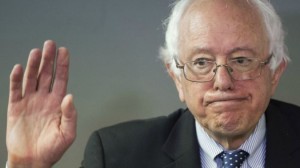The more I hear from U.S. Sen. Bernie Sanders, the more convinced I become that it’s time to end the qualifier when describing his economic philosophy.
The presidential candidate calls himself a “democratic socialist.”
I believe I understand the message he’s trying to convey, which is that his brand of socialism isn’t dependent entirely on the government taking care of every American’s needs.
Sanders has been using the democratic socialist label — again, in my view — to take some of the sting out of the s-word that conservatives are fond of using to describe policies such as, oh, the Affordable Care Act.
Then on Thursday night, near the end of the Democratic presidential candidate debate with Hillary Rodham Clinton, Sanders launched into a lengthy riff about the two political leaders he most admired.
He ended with Winston Churchill, but only after he described Franklin Delano Roosevelt’s tenure as president.
He told us how FDR took office in 1933 while 25 percent of Americans were out of work. We were in the throes of the Great Depression.
How did FDR get us moving again? By energizing government to create jobs. The WPA and CCC were government-financed employment programs. The money to pay for them didn’t just materialize. Americans paid for them with taxes.
Social Security became law in 1935.
Gradually, the nation began to work its way out of the Great Depression.
Then came Pearl Harbor in December 1941. Everything changed after that.
But as I listened Thursday night to Sen. Sanders go on and on about FDR’s leadership, I was struck by the belief that he was talking about socialism. Not just a form of it, but the unvarnished version of it.
I happen to share Sanders’ view that 80-plus years ago, President Roosevelt faced a terrible, miserable set of circumstances when he took his seat behind the big desk in the Oval Office. He felt he had to do something dramatic to get the country going.
Sanders also said something else at the end of the debate that I found a bit curious. He seems to believe the nation is ready for another “revolution,” that the income inequality gap of today sets up a need to create some kind of massive government infusion of money to bolster working families who are suffering while the “top 1 percent of Americans” are doing fabulously.
He wants free college education. Sanders vows to bring universal health care to every American. He intends to push for a dramatic increase in the federal minimum wage.
How does he intend to pay for it? He wants to raise taxes on all Americans.
How, then, is he going to do that with Republicans retaining control of the House of Representatives, where all tax legislation must originate?
He sounds like a socialist.
Not a democratic socialist.
He sounds like the real thing.
I believe I heard someone who is overreaching as he pulls the lever on the economic alarm bell.
FDR faced a grave economic crisis the likes of which will not confront the next president.
